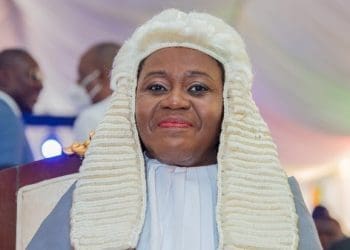The Speaker of Parliament, Mr Alban Sumana Kingsford Bagbin, has reignited national debate over the need for a new parliamentary chamber, warning that the structural integrity of the current facility could be at risk as the number of Members of Parliament (MPs) continues to rise.
Speaking during the swearing-in of two new National Democratic Congress (NDC) legislators—Mr Bernard Bediako Baidoo for Akwatia and Professor Alidu Seidu for Tamale Central—Mr Bagbin noted that the addition of new MPs had brought the House to its full capacity of 276 members.
“We are happy now to have the full complement of the House. We now have 276 MPs… Anytime the number increases, we have to create space for the member. So please, before this number increases, you must, as a country, as a Republic, start looking for a proper place,” the Speaker cautioned.
“If not, the integrity of this structure is being undermined—a word to the wise is enough,” he added.
Structural concerns and past renovations
Parliament’s current chamber, though recently renovated for €2.26 million, was designed decades ago to seat far fewer lawmakers than today’s growing legislative body. The Speaker indicated that the physical space and facilities are increasingly inadequate to support effective parliamentary work, warning that further expansion in the number of MPs could compromise the building’s safety and functionality.
His comments come as Parliament gears up for the presentation and debate of the 2026 Budget Statement and Economic Policy, a period expected to test the chamber’s capacity to host large sittings and extended deliberations.
A politically divided House
The current composition of Parliament stands at 185 members for the Majority Caucus, which includes support from four independent MPs, and 87 members for the Minority Caucus. With political pressure mounting ahead of the next general elections, questions around parliamentary infrastructure and institutional capacity have resurfaced.
Controversy over the $200 million chamber
Mr Bagbin’s remarks have rekindled memories of the 2019 controversy surrounding the proposed construction of a new $200 million parliamentary chamber, which the government was eventually forced to shelve following intense public backlash.
At the time, many Ghanaians took to social media platforms such as Facebook and Twitter to criticise the proposal as wasteful and insensitive, arguing that national resources should instead be directed toward pressing social and economic challenges.
Civil society groups, professional associations, and ordinary citizens demanded transparency and justification for what they described as an extravagant plan.
Following weeks of protests and criticism, the Parliamentary Service Board issued a statement announcing that the proposal had been withdrawn.
“The Board, upon reviewing representations made to it by well-meaning Ghanaians, accordingly took the development of the new chamber block out of its present agenda,” the statement read.
Renewed conversation on parliamentary infrastructure
Six years on, Mr Bagbin’s warning has reopened discussion on whether the time has come to revisit the issue—this time grounded in safety and capacity concerns rather than luxury or prestige.
Observers say that while the Speaker’s concerns are legitimate, any renewed proposal for a new chamber will need to be approached with transparency, modesty, and broad public consultation to avoid a repeat of the 2019 backlash.
For now, however, the Speaker’s remarks serve as a reminder of the delicate balance between national infrastructure priorities and the institutional needs of Parliament, as Ghana’s democracy continues to evolve.














